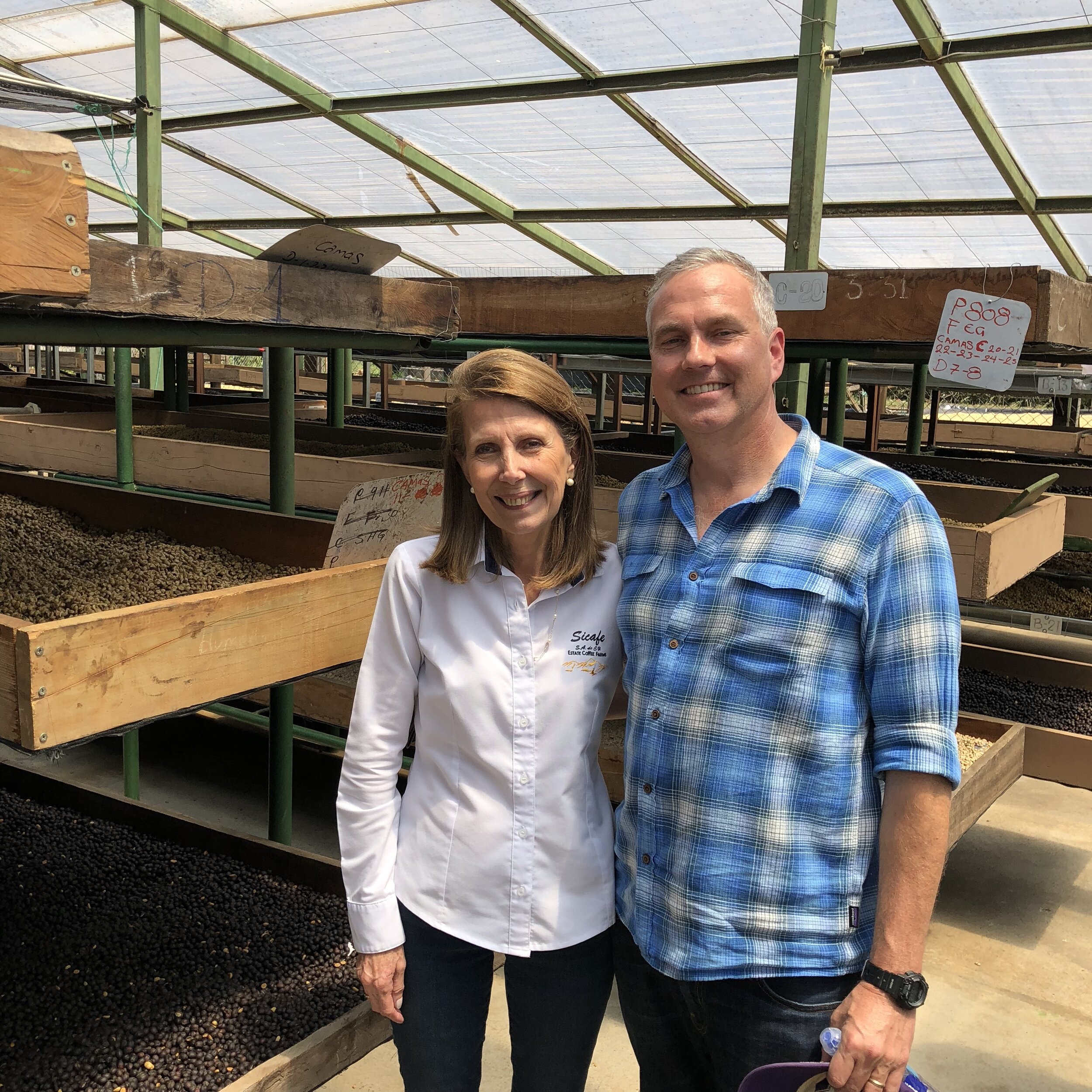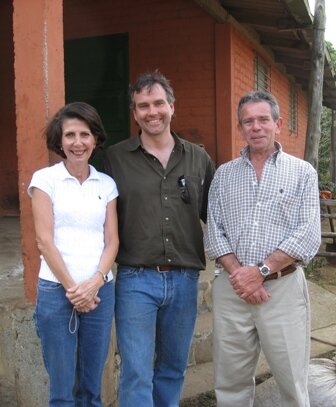by Scott Merle
I had been a participant in many of the early Cup of Excellence International juries, receiving invitations from George and Susie to many of the “firsts,” including the first El Salvador competition in 2003. I recall my introduction to these amazing coffees as both surprising and comforting. These were the days when processing was all washed and farms, varieties, and producers stood out from others by intensity of flavors, clarity of cup, and integrity of the operations. Do no harm, stay out of the way, pay attention to the details, let the coffees speak for themselves. These Salvadors showed sizzle and spark, with a slightly rebellious and spunky character, not quite as stoic and mature as their refined Guatemalan cousins. Where otherwise one would expect merely caramel and cocoa we discovered champagne and hibiscus and peach and pomegranate and luscious sweet blackberry and complex flavors that trailed on and on and on. I was hooked and wanted to taste more.
Following the 2005 auction where I bought a 21 bag lot (at $5.00/lb) of what I thought was the best coffee in the field at #6, I received a phone call. It was Carmen Elena Silva, calling to congratulate me and thank me for buying their coffee. She asked about making a visit and it was later that year after all the work at the farms was complete that she and Rafael came for a visit to Olympia Washington; we got some early snow that year and Rafael had never seen snow before. It was quite a treat to get to know these two engaging people and understand and talk about how our lives and work intersected and complemented each other’s. It was becoming, before I realized it, another deep and lasting relationship among many I have forged in the coffee world.
These days we communicate electronically, and I am disappointed to have missed our annual visit to Apaneca as the first notices of travel restrictions due to Covid impacted international flights in March. But we cupped all the lots they sent, wrote our contracts, and otherwise got everything lined up as usual. This year’s coffees are as spectacular as always; I really don’t know what else to say about them. As the harvests come and pass Rafael and Rafa are happy to tinker with new varieties on some of the farms, and continue to modify the washing and anaerobic processes that appeal to many of the green buyers out there. These lots often sell out before they even make it to our offer sheet, regardless of pricing in the high four-dollar range. Some years see more honey-processed labels, this year was an anaerobic-heavy year. There are a few more straight up naturals this year, and their “regular” washed La Fany and Divina Providencia lots are as beautiful as ever. I bet we can show you something that will blow you away.


SM What was the first year Rafael decided to participate in the Cup of Excellence? Was it 2005? (I was on the first jury in 2003, but don’t remember your coffees before we bought in 2005)
CES The first year we participated in the Cup of Excellence was in 2005. We did not participate the first two years because we did not know at that time.
SM What was your reason for participating?
CES Our reason for participating was because we were looking to open new opportunities and get exposure in the world of coffee.
SM I remember receiving a phone call from you in 2005, after we had bid on the Siberia coffee. Is that right? Did you call me out of the blue?
CES I did call you out of the blue in 2005 after you bought Siberia at the auction. I thought if we could start a relationship with you and your Company, Batdorf & Bronson, we needed to travel to visit and get to know you and you get to know us. This way instead of being a one-time purchase it turned out to be a long business and personal relationship, which still stands. Our trip lasted 4 days, arriving in Seattle December 1 and leaving December 4 2005. It was worth it. Needless to say, Rafael had never seen snow. Remember? He will never forget the visit and the experience. And of course, we will never forget the royal treatment we received from all of you. We really felt pampered and very important. Thank you.
SM Was Cup of Excellence helpful to the sale of your coffees?
CES Cup of Excellence helped us but I believe it helped much more the publicity at Batdorf and Bronson as well as Mercanta with La Fany. It gave us exposure and helped us grow. At that time it gave us a push to start our paperwork to become Exporters as well, which was another step forward.
SM What was the motivation to building your own coffee business beyond the farming - Beneficio San Pedro?
CES Our motivation to start our own Mill was because Rafael´s Father used to own a Wet Mill in a farm which was sold during the Salvadoran conflict back in 1989 - 1990. Rafael´s dream was to have his own Mill sometime and in the year 2007, Penagos Wet Mills were sold in El Salvador by a Cooperative that had imported some and Rafael bought two Modules. His idea of transparency has always been his top priority. We stored the modules until we could start the project in 2010 when we started building the Mill. Little by little and by 2013 we had installed the dry Mill as well, although until this day, every year something is being built, or changed. He is a perfectionist. Because our farms are all 1,450 + masl, our Mill handles only Specialty coffees. We work with small producers of the area as well, helping them better their farms, showing them to pick the cherries in perfect ripeness, and getting better prices for their coffee, which has been, I think, more motivation for us seeing them grow as well. Now we handle farms from other areas of El Salvador too.
SM What have been some of your biggest struggles as a coffee producer?
CES Some of our biggest struggles as coffee producers have to do with climate, plant diseases, like Rust which has been really bad for everyone, weakening the plants and ending in a decrease in production. We have been renovating since two years ago the farms 15% of the areas every year but it will take several more years to see the results. Some other problems no less important, are the lack of support of our Banks, the lack of pickers at the time of harvest which has turned out to be a real problem. The young people do not want to participate any more so every year we struggle to find people to come to the farms. What we do is invest in transport, taking the pickers in the morning to the farm and bringing them down every afternoon. Once they finish one farm, we take them to the next one. The lack of support of our government. They promise much but deliver nothing.
And the real problem with El Salvador is that we do not have forests, so the only real forests are coffee plantations. No coffee plantations results in less water. There is another issue which we struggle as Specialty Coffee producers and is that our process is expensive due to the strict protocol we use in handling not only our coffee but our client´s coffees and this is an issue that the buyers not always are aware of. Our responsibility to the producers here and to our buyers delivering the coffees they are expecting is our objective. I see that Specialty Coffees has been declining in the last few years as more and more of our clients ask for more SHG´s than Specialty. This is really frustrating because our costs are high, the processes are expensive and buyers are reluctant to pay more.
SM What has it been like to have your children able and willing to help in the business? Was this something you and Rafael had hoped for?
CES Coming from a family of coffee producers, like Rafael, which involves tradition, is very important to have at least one of your children continue in your footsteps. The legacy of father to son is taken very seriously since, it is true that many things have changed during the years, more technology, more accessibility, etc. but coffee is all tradition. That does not change, coffee grown under shade, picked by hand, and learning first-hand information that has been in the family for many decades.
Having our two sons involved in our business has been a true reward to our efforts since we started Sicafe. It gives us peace of mind knowing that what we started, they can continue and better.
SM What do you hope for the future of the coffee business?
CES Our farms, our Mill is our life. We have invested all we have in order to make our Company grow. In these times of uncertainty with so much need everywhere and lack of work because here in El Salvador we have been in quarantine for over 3 months. Many businesses have gone bankrupt. Thanks to God agriculture is one of the few things that the government has kept open so we have been able to keep our shipments going and our workers in the Mill and farms with a steady job, and needless to say, food in their tables.
We hope that things can get better and we can continue working to deliver the best coffees possible to the world, keep working with our neighbors, and that the prices we receive can make ends meet.
SM What can coffee lovers do in the US to help promote specialty coffees and support coffee producers?
CES Keep drinking coffee but do not settle for a cheap one. After you have tasted the real thing, is difficult to go back. Help your coffee shops with your continued business. Give them your support, show them that they are in the right business. Shop owners can share education with their customers in the amount of effort, labor and skill it requires to produce one cup of coffee, from the seed to the cup and how many people are involved in the process.

